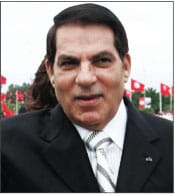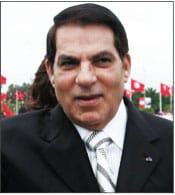Commentators the world over have denounced the former president’s exploitation of international post-9/11 sentiments. Not only had the dictator abused the resources of the country for his personal gain, but added insult to injury by seeking to remove all solace in the curbing of religious freedom.
The faithful were forced to obtain police permits for frequenting mosques for prayers.
Yet, religious oppression had been a legacy in Tunisia for more than fifty years, according to Nadim Sohail of Muslim Matters. “When Habib Bourguiba took power in 1957 after gaining independence from France, the president followed the steps of Ataturk in Turkey and tried as hard as he could to secularize the country,” writes Sohail. “He reformed the laws and education system and …went as far as banning the headscarf for women.”
In addition, Bourguiba declared that fasting during Ramadan should not be observed for it reduces productivity. He appeared on television with his cabinet, eating and drinking during Ramadan and even sought to force the chief mufti of the time to pass a fatwa accomodating the desires of the state, and essentially robbing dedicated Muslims of their faith.
The mufti refused, announcing instead that whoever did not observe the fasting has knowingly rejected his well-known religious duty, adding that fasting [in the Islamic tradition, from sunrise to sunset] in no way reduces productivity. Still, this did not stop the rulers from trying to suppress Islam in a so-called Islamic country.
Sohail continues: “His successor, Ben Ali, who took over from Bourguiba after a coup d’état in 1987, continued the policy of secularism. The Tunisian government restricted the wearing of headscarves (hijab) in government offices and discouraged women from wearing them on public streets and public gatherings, and decried hijab as a ‘garment of foreign origin having a partisan connotation.’ There were also frequent reports that police sometimes harassed or detained men with beards whom the government suspected because of their ‘Islamic’ appearance. In 2006, the Tunisian president declared that he would ‘fight’ the hijab.”
By late 2010, several thousand Tunisians expressed their anger over the lack of freedom, police state, implementation of torture, unemployment, corruption, rising prices of food and fuel, among other symptoms of a failed state. Nadim Sohail of Muslim Matters says: “After violent marches all over the country, the protests finally reached Tunis where an emergency curfew was put in place. In [a] few days, security forces killed between 20 and 50 people.”
The president eventually faced the reality that his regime was over when civil war threatened Tunisia. The dictator fled to Saudi Arabia, where elections were abandoned long ago in favor of kingship, another form of dictatorship forbidden in Islam, one that killed its own people in order to establish the Saud dominion. However, as like minds huddle together, it is predictable that the just precepts of religion will remain the last item on the agenda, unless it is to demean or abase it with their conduct.
The faithful were forced to obtain police permits for frequenting mosques for prayers.
Yet, religious oppression had been a legacy in Tunisia for more than fifty years, according to Nadim Sohail of Muslim Matters. “When Habib Bourguiba took power in 1957 after gaining independence from France, the president followed the steps of Ataturk in Turkey and tried as hard as he could to secularize the country,” writes Sohail. “He reformed the laws and education system and …went as far as banning the headscarf for women.”
In addition, Bourguiba declared that fasting during Ramadan should not be observed for it reduces productivity. He appeared on television with his cabinet, eating and drinking during Ramadan and even sought to force the chief mufti of the time to pass a fatwa accomodating the desires of the state, and essentially robbing dedicated Muslims of their faith.
The mufti refused, announcing instead that whoever did not observe the fasting has knowingly rejected his well-known religious duty, adding that fasting [in the Islamic tradition, from sunrise to sunset] in no way reduces productivity. Still, this did not stop the rulers from trying to suppress Islam in a so-called Islamic country.
Sohail continues: “His successor, Ben Ali, who took over from Bourguiba after a coup d’état in 1987, continued the policy of secularism. The Tunisian government restricted the wearing of headscarves (hijab) in government offices and discouraged women from wearing them on public streets and public gatherings, and decried hijab as a ‘garment of foreign origin having a partisan connotation.’ There were also frequent reports that police sometimes harassed or detained men with beards whom the government suspected because of their ‘Islamic’ appearance. In 2006, the Tunisian president declared that he would ‘fight’ the hijab.”
By late 2010, several thousand Tunisians expressed their anger over the lack of freedom, police state, implementation of torture, unemployment, corruption, rising prices of food and fuel, among other symptoms of a failed state. Nadim Sohail of Muslim Matters says: “After violent marches all over the country, the protests finally reached Tunis where an emergency curfew was put in place. In [a] few days, security forces killed between 20 and 50 people.”
The president eventually faced the reality that his regime was over when civil war threatened Tunisia. The dictator fled to Saudi Arabia, where elections were abandoned long ago in favor of kingship, another form of dictatorship forbidden in Islam, one that killed its own people in order to establish the Saud dominion. However, as like minds huddle together, it is predictable that the just precepts of religion will remain the last item on the agenda, unless it is to demean or abase it with their conduct.
Main Image:

Thumbnail Image:







